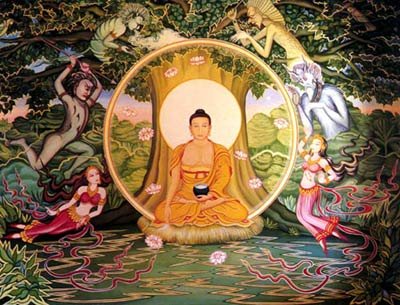Buddhism

Buddhism /ˈbudɪzəm/ is a religion and dharma that encompasses a variety of traditions, beliefs and spiritual practices largely based on teachings attributed to the Buddha. Buddhism originated in India, from where it spread through much of Asia, where after it declined in India during the middle ages.
In a previous post I wrote about the 5 dominant world religions. I promised to write about various religions in future, and will discuss a few points on each religion. If you would like to read my previous post the please click
Today I want to write a little bit about Buddhism. I enjoy doing research and especially enjoyed doing some research on this specific religion. This is what I found:
Buddhism started over 2500 years ago and is the dominant world religion in the East. This religion has more followers than any other religion. Their concepts have influenced the Western culture positively and more people have taken up meditation and non-violence. Their teachings are based on the teachings of a young Indian prince. His whole life was lived in shelter, and when he saw the suffering on the outside of the palace walls, he left his life in the palace to seek answers to the problem of suffering. He found his answer eventually and became the Buddha ( The enlightened one)

The remaining part of his life of 45 years was spent teaching people about the path to liberation and suffering. He then set up a community of monks. There are many forms of Buddhism. Some stick to rituals and worship their forefathers, while others reject any rituals or gods, and keep to meditation.
1. All forms of Buddhism, share some respect and the end goal is to end suffering.
2. The Buddhist consider knowledge only as far as it remains practical.
3. Speculation about matters like God, the afterlife or even nature of the universe is rejected, and followers are urged to focus instead on the Four Noble Truths.
The Four Noble Truths contain the essence of the Buddha's teachings. It was these four principles that the Buddha came to understand during his meditation under the bodhi tree. The truth of suffering (Dukkha)The truth of the origin of suffering (Samudāya)The truth of the cessation of suffering (Nirodha)The truth of the path to the cessation of suffering (Magga)

Buddhists are not atheistic. They just don't believe that our world is created and ruled by any God. Buddhists believe that humans suffer, because they continually strive after things that do not promise forever lasting happiness.
The Buddhist said of death:
Life is a journey. Death is a return to earth. The universe is like an inn. The passing years are like dust. Regard this phantom world As a star at dawn, a bubble in a stream, A flash of lightning in a summer cloud, A flickering lamp - a phantom - and a dream
If you would like to read more about the Buddhism religion, and the 4 noble truths, feel free to follow this link. http://buddhanet.net/4noble.htm
Although we all have our own beliefs and religions, it is still very interesting to read about what others believe in, and we are all on the same journey.
At the end we all go back into the ground, and return to mother earth.
I am totally up for a good debate and if you don't agree with me on any of my posts, feel free to contact me and we can discuss your opinion. Everyone is entitled to their own opinion. If you like my posts please follow me on @serioustruth
❤ Keep on Steeming ❤
Hi @serioustruth
Very interesting article. I however think that if you don't believe in God you are an atheist.
I would like to know what are the things that would give forever lasting happiness, perhaps you can do a follow up article on that.
I think that most of us chase after money and possessions, which definitely don't bring everlasting happiness, and are so busy with it that we miss living our life in the end .
Hi @rynow,
I wanted to elaborate on your comment about atheism and hopefully engage in a discussion. I found a good article that might help explain the relationship between Buddhism and the belief in God. Here is the excerpt, link below:
"If atheism is the absence of belief in a God or gods, then many Buddhists are, indeed, atheists.
Buddhism is not about either believing or not believing in God or gods. Rather, the historical Buddha taught that believing in gods was not useful for those seeking to realize enlightenment. In other words, God is unnecessary in Buddhism, as this is a practical religion and philosophy that emphasizes practical results over faith in beliefs or deities.
For this reason, Buddhism is more accurately called nontheistic rather than atheistic."
Link: https://www.thoughtco.com/atheism-and-devotion-in-buddhism-449718
So it's not that Buddhists do or do not believe in God, but rather, they do not see it as a necessary precondition for achieving lasting peace. Buddhism does not focus on any sort of deity as a result. So while you are correct that a Buddhist who doesn't believe in God is an "atheist" in the literal sense, the description doesn't necessarily accurately represent Buddhism or its core teachings.
Let me know your thoughts!
Cheers.
Well done, well summarised. A fun fact I enjoy is these Eastern religions all have an assumption of Circular Time in the key philosophies in the East, everything repeats again and again. Where as in the West we hold the fundamental assumption of Linear Time, you can't go back, things happen and then time marches forwards.
Your comment that "Buddhists are not atheistic. They just don't believe that our world is created and ruled by any God" is very interesting. Pure Land Buddhist do "rely" on a cosmic Buddha, called Amitabha or Amitayus and believe they will be born in a pure land at the time of death. That said, Amida, while embodying compassion, was not considered to have been a creator and nor does he rule/judge us humans. To my mind, this is one of the main differences with Christianity. Another is that many Buddhists consider the Pure Land teaching to be an expedient, as are all conceptual systems, since truth cannot be accurately expressed in terms - it must be experienced. If this triggers interest, the Lotus Sutra may be worth a look. -John
It takes a lot of work to get there. Christianity is by grace through faith, unlike other religions like Buddhism and the others.
Buddhism derives from Christianity. Jesus is the author of all the things that yoga seeks after.
Real Buddhist abandons everything to achieve Nibbhana.
Perhaps.